R. K. Narayan
R. K. Narayan
“RK Narayan – The simple man” is gleaned and synthesized by Maddy, an Indian living in U.S.A, [“A nomad in today’s world, a world traveler in essence”] [http://maddy06.blogspot.com.] [Thoughts,opinions and musings of a restless nomad]
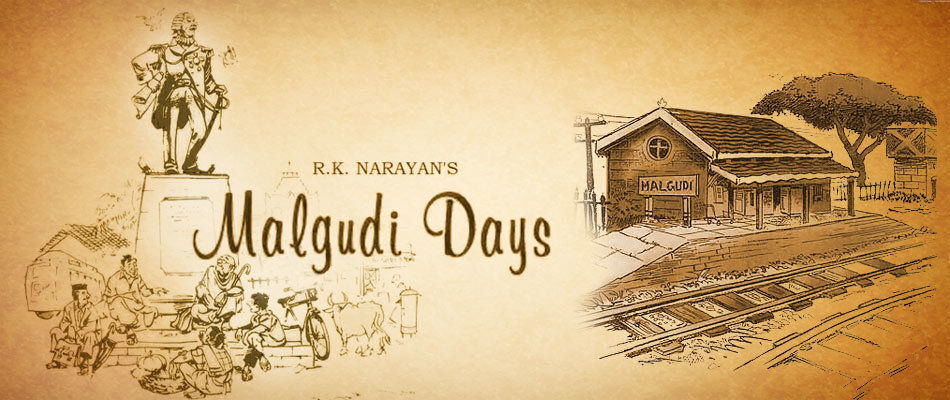
They are the only people who have realized their place in life, said RK Narayan about Malayalis, the people of Kerala!! Surprised? It was not related to any great person or event, but to the Malayali fondness for an Umbrella!! With his unopened umbrella in hand, Narayan was a familiar figure walking in Mysore. For him an umbrella was “a status symbol and an elegant adjunct to walking”. He had collected umbrellas from all over the world, and the strange thing was that he retained most of them. He hated lending his umbrella to anyone. He liked Kerala and its people because of their ‘devotion to umbrellas’ – This recollection comes from TS Nagarajan the photo journalist.
unopened umbrella in hand, Narayan was a familiar figure walking in Mysore. For him an umbrella was “a status symbol and an elegant adjunct to walking”. He had collected umbrellas from all over the world, and the strange thing was that he retained most of them. He hated lending his umbrella to anyone. He liked Kerala and its people because of their ‘devotion to umbrellas’ – This recollection comes from TS Nagarajan the photo journalist.
RKN is a much loved writer and a personal favorite. There is so much of him beyond his books and autobiography that some would be interested in, so I ventured to find some of that stuff. This collection will I hope, help those uninitiated into the world of the creator of Malgudi – Mr Rasipuram Krishnaswami Ayyar Naranayanaswami.
RKN loved walking –Walking was not a mere routine exercise for him but the main spring of all his thinking. He once said: “I pray I should be able to walk all my life and write a book called Testament of a Walker on the pleasures and problems of walking, the equipment needed, the dos and the don’t s etc.” Here, for instance, is the novelist and journalist Khushwant Singh on a visit to Mysore forty years ago: ‘Being with Narayan on his afternoon stroll was an experience. He did not go to a park but preferred walking up the bazaars . . . He would stop briefly at shops to exchange namaskaras with the owners, introduce me and exchange gossip with them in Kannada or Tamil.’
How many of you know that it was his mentor Graham Greene who asked him to change his name to RK Narayan?? (Reminded me of my friend K Vijayan Nair who was quite unsuccessful in his attempt at terming himself KVN Air) This, Greene explained (note that in those days Libraries were the bigger purchasers of books), would help ‘old ladies in libraries’ to remember him.”
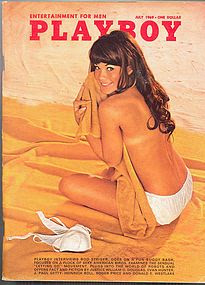 The July 69 issue of Playboy had, amongst the gorgeous exhibition of mammaries belonging to one Nancy McNeil and many others, a story called ‘A Breath of Lucifer’. Guess who wrote it? RKN!! Those who had no access to the nice color version later read it in the short story collection ‘Under the banyan tree’. The story as such is about the dependence of a temporarily blinded man upon his male nurse. Funnily the story was dictated by RKN when he was recovering after his cataract operation!! But I am still to figure out how it ended up in Playboy…
The July 69 issue of Playboy had, amongst the gorgeous exhibition of mammaries belonging to one Nancy McNeil and many others, a story called ‘A Breath of Lucifer’. Guess who wrote it? RKN!! Those who had no access to the nice color version later read it in the short story collection ‘Under the banyan tree’. The story as such is about the dependence of a temporarily blinded man upon his male nurse. Funnily the story was dictated by RKN when he was recovering after his cataract operation!! But I am still to figure out how it ended up in Playboy…On his walks Narayan always sucked a clove, cardamom or betel nut stored in a tiny Kodak film box he carried in his pocket. He always bought his stock from Srinivasa Stores on Sayaji Rao Road. TS Satyan adds – I have seen him smilingly rattle the film box before his friends and proclaim: “I carry my life blood in this. My pen moves only when I have a betel nut in my mouth. Without one, I can neither think nor write!” Once I offered a New Year gift to him – a small, elegant silver box – to store his betelnut. My wife had bought it for him in Nepal. He thanked me and said that he preferred my Kodak film box instead and suggested that I make a present of the silver one to his younger brother Srinivasan, also a betel addict.
TSS adds in a Hindu interview – If curd rice was Narayan’s favorite dish, coffee was undoubtedly his favorite drink. He was a strict vegetarian and, when invited for a meal, would often tell my wife not to prepare many dishes. “I am happy with curd rice and lime pickle,” he would tell her. He thought, “The sound of curds falling on a heap of rice is the loveliest sound in the world.” He did not impose his regimen on his hosts. But I know for sure, that he made a great deal of fuss about coffee. He relied on his sister-in-law, Sulochana, to prepare the brew. This gracious lady, wife of his younger
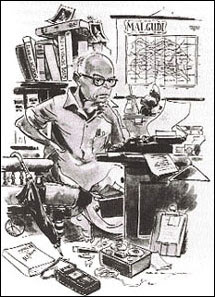 brother Seenu, was a great friend of my wife Ratna. She would bemoan: “It is a terrible task for me, making the ‘perfect’ coffee for Kunjappa––Narayan’s pet name. The warmth of the drink and the mix of sugar, milk and decoction have to be very, very correct. Even if there is a slight variation in warmth or flavour, he will ask me to make it all over again. One has to be a genius to ‘repair’ it.”
brother Seenu, was a great friend of my wife Ratna. She would bemoan: “It is a terrible task for me, making the ‘perfect’ coffee for Kunjappa––Narayan’s pet name. The warmth of the drink and the mix of sugar, milk and decoction have to be very, very correct. Even if there is a slight variation in warmth or flavour, he will ask me to make it all over again. One has to be a genius to ‘repair’ it.”Natwar Singh, a friend recalls – At the U.N. Dining Room, at the end of luncheon, R.K. wanted a cup of coffee. The waiter asked him, “Black or white, sir?” R.K. replied, “Brown”.
At a wedding, Satyan says – He accepted a cup of coffee forced on him by the bride’s brother. I shuddered at the thought of his rejecting it much to everyone’s embarrassment. He gingerly held the cup in hand and took one sip and then looked at me raising his eyebrows. I could make out that what he had in hand was not his ‘cup of coffee’. Both of us were aware of the average quality of coffee served at south Indian weddings. After rotating the cup for a while with his nimble fingers, he quietly deposited it under the chair and went over to someone he knew for a chat.
N Ram of Hindu reminiscences – Our favourite haunt was the Southern Spice restaurant at the Taj. He always sat at a particular table and knew exactly what he wanted, which would generally be a dosa or an aappam. He was very disciplined in his eating habits. He wouldn’t eat anything or take any soft drink before his meal. But he loved desserts; he also loved chocolates and Indian sweets. Late into the night, if he was hungry, he would hunt the house for sweets. His son-in-law is diabetic, but he had no such problems.
There is a very interesting article written by a Swedish writer Zac o’zeah about RKN in the Hindu- It provides you great insight about the person himself. Following a terrible encounter with ‘Times’ interviewers which resulted in hospitalization, RKN refused interviews. Zac had flown all the way to India to meet the great man. But RKN would not see him. It was only when he heard that Zac was living in a Triplicane hotel and ate South Indian dishes that his curiosity led to an invitation home. After some patient minutes, RKN got to the point – what south Indian dishes had Zac eaten? He was pleased to hear that both Idli & Dosas had been tried!!
Frugal – He was a simple man, with simple tastes and simple wants (but he did possess a Mercedes car!). Once he had the following to say to the script writer of Malgudi days . It was time for me to leave. I pulled out the copy of Bachelor Of Arts I had just bought at Gangarams and asked whether he could sign it for me. And it was then, in a rare, precious, cameo moment, that I saw what R K Narayan was all about. He took the book and turned it around. “Two hundred rupees?!” he said indignantly, seeing the price at the back. “You paid two hundred rupees for this book?! Why do you waste your money like this, I say? You can get the same thing in the Indian edition for just eighty rupees. What a waste!”
His sense of humor could be infectious- Stayan continues – Whenever I went to Madras I used to find Narayan constantly talking to friends on a cordless telephone. “Without this I cannot survive,” he would tell me. When young friends visited him, they sought his blessings and prostrated at his feet. Narayan made them laugh saying: “This is an advantage that age bestows on a man even if he is an utter ass!”
Music – It may be noted in passing that, during his dark days, music was a source of solace to him. R.K. was a self-taught veena player, but good enough to earn the commendation of the veena maestro of Mysore Palace, Vidwan Doreswamy Iyengar. They spent many hours together, and R.K. showed himself to be quite good in alapana and kirtana rendering. In return, R.K. became Doreswamy Iyengar’s English teacher, and helped him obtain his B.A. degree. He had a hundred-year-old veena on which he played in a very unorthodox manner. “I will pluck the strings in any order, in any way I like. I want only the sound,” he used to tell his music teacher and close friend, who also taught his daughter Hema. Iyengar was already a veena wizard when he studied with me in college. He had already become a musician at the Royal Court in Mysore. Narayan would often say, “But for the education I received, I think I would have become a Bhagavatar – professional classical musician.” Surprisingly, music as a theme and musicians as characters do not figure in Narayan’s novels, rues a common friend, H.Y. Sharada Prasad. This linked article details his relationship with the Veena, music & Iyengar.
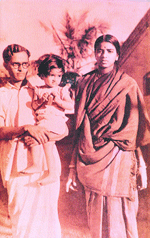 Family Life – In July 1933, R.K.Narayan fell in love. He was staying in Coimbatore with a sister, and one day he “saw a girl drawing water from the street tap and immediately fell in love with her.” This was Rajam, 15 years old at the time, tall (taller than R.K. by a couple of inches), slim and good-looking. He cultivated the friendship of Rajam’s book-loving headmaster father, Nageswara Iyer, and one day he came out saying, “Sir I want to marry your daughter.” They were married shortly thereafter, and after Hema their daughter was born, Rajam succumbed to Typhoid. ‘The English teacher’ is based on his own wife’s death and his dark days after the sad event. Many years later, it was a tragedy that stopped Narayan writing – His daughter Hema died of cancer in 1994. RKN left us later in 2001. These two women meant a lot in his life and without them he lost interest. He moved from Mysore back to Chennai in his older years to be close to Hema. Hema’s last days were terrible for RKN – He said this to N Ram – “It (chemotherapy) is like setting fire to the house to roast the pig.”
Family Life – In July 1933, R.K.Narayan fell in love. He was staying in Coimbatore with a sister, and one day he “saw a girl drawing water from the street tap and immediately fell in love with her.” This was Rajam, 15 years old at the time, tall (taller than R.K. by a couple of inches), slim and good-looking. He cultivated the friendship of Rajam’s book-loving headmaster father, Nageswara Iyer, and one day he came out saying, “Sir I want to marry your daughter.” They were married shortly thereafter, and after Hema their daughter was born, Rajam succumbed to Typhoid. ‘The English teacher’ is based on his own wife’s death and his dark days after the sad event. Many years later, it was a tragedy that stopped Narayan writing – His daughter Hema died of cancer in 1994. RKN left us later in 2001. These two women meant a lot in his life and without them he lost interest. He moved from Mysore back to Chennai in his older years to be close to Hema. Hema’s last days were terrible for RKN – He said this to N Ram – “It (chemotherapy) is like setting fire to the house to roast the pig.”About Mysore – In his autobiography My days – “Unlike Madras, where even a shirt on one’s back proves irksome, here (in Mysore) one could dress properly—coat, cap and footwear, which my father insisted both as a headmaster and a teacher.’’
Garbo – When his wife, who could never read English, but was the greatest support for RKN, died at
 an early age, Narayan sought to communicate with her across the worlds. Greta Garbo once asked the author to teach her the secrets of meditation. Narayan modestly declined, explaining that he had not been privy to any such ‘secrets’. His meeting with Garbo is described in this article by Donald Keene – Another guest was R. K. Narayan, the great Indian writer. Garbo sat at the end of a sofa not saying anything. Looking at her I could not help but be aware that Garbo was no longer beautiful. I remember particularly that her lipstick was smeared. But when Narayan began to speak of his conversations with his late wife in the world of the dead, Garbo’s interest was awakened, and for a while we saw again the face that had captivated the world. Narayan taught her theGayatri mantra and Garbo offered in return a cigarette!!
an early age, Narayan sought to communicate with her across the worlds. Greta Garbo once asked the author to teach her the secrets of meditation. Narayan modestly declined, explaining that he had not been privy to any such ‘secrets’. His meeting with Garbo is described in this article by Donald Keene – Another guest was R. K. Narayan, the great Indian writer. Garbo sat at the end of a sofa not saying anything. Looking at her I could not help but be aware that Garbo was no longer beautiful. I remember particularly that her lipstick was smeared. But when Narayan began to speak of his conversations with his late wife in the world of the dead, Garbo’s interest was awakened, and for a while we saw again the face that had captivated the world. Narayan taught her theGayatri mantra and Garbo offered in return a cigarette!!Some notes about his writing – R. K. Narayan began his first novel on a day (1930-Vijayadashami) selected for its auspicious quality by his grandmother, a firm believer in horoscopes.
Narayan started reading in earnest, the classics of English literature, and writing. He read out his pieces to a close band of friends, and after priming the audience with coffee and snacks, asked for their opinion. Such reviews were laudatory, “brilliant” being the unanimous word.
RKN once queued for the Master of Arts course, viewing the degree as an expedient in job hunting. While walking up the university stairs to submit the form, a friend warned of the privations of M.A. Narayan turned around and came down the steps in a hurry, never to try their ascent again. For a short period (2 days) in his life he was a teacher in Mysore (the only job he ever held). He resigned
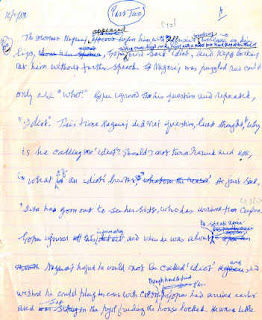 the job when he was asked to take a PT class!! His first attempt at writing was a play called ‘Home of Thunder’ which was neither played nor published. Hindu offered to publish his attempts in ‘Letters to editor’. Others rejected him since he used plain prose as against Victorian prose.
the job when he was asked to take a PT class!! His first attempt at writing was a play called ‘Home of Thunder’ which was neither played nor published. Hindu offered to publish his attempts in ‘Letters to editor’. Others rejected him since he used plain prose as against Victorian prose.Rajya Sabha – He looked at Parliament, as a cynic and used to regale the children and his nieces with stories of the happenings in the House. He seemed to enjoy the masala dosa at the Parliament house canteen, perhaps, it reminded him of Malgudi. RKN was always fond of children. When Narayan was appointed a member of the upper house of parliament in Delhi, in his maiden speech, he spoke of children having so much homework that they had no time to play. He focused on the school bag. “The school bag has become an inevitable burden for the child. I am now pleading for abolition of the school bag, as a national policy, by an ordinance if necessary. I have investigated and found that an average child carries strapped to his back, like a pack-mule, not less than six to eight kilograms of books, note books and other paraphernalia of modern education in addition to lunch box and water bottle..”.
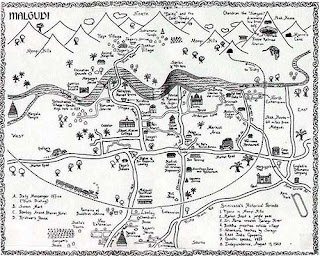 Malgudi – This of course is the imaginary town created by RKN in his novels. Fans would recall the various buildings and roads like Kabir street, Market road, Lawley extension, Nallappa grove, Albert mission school & college, the river Sarayu….Neha Viswanathan uploaded this brilliant map depicting the lanes & by lanes of Malgudi. RKN says – “Malgudi was an earth-shaking discovery for me, because I had no mind for facts and things like that, which would be necessary in writing about Malgudi or any real place. I first pictured not my town but just the railway station, which was a small platform with a banyan tree, a station master, and two trains a day, one coming and one going. On Vijayadasami I sat down and wrote the first sentence about my town: The train had just arrived in Malgudi Station.”
Malgudi – This of course is the imaginary town created by RKN in his novels. Fans would recall the various buildings and roads like Kabir street, Market road, Lawley extension, Nallappa grove, Albert mission school & college, the river Sarayu….Neha Viswanathan uploaded this brilliant map depicting the lanes & by lanes of Malgudi. RKN says – “Malgudi was an earth-shaking discovery for me, because I had no mind for facts and things like that, which would be necessary in writing about Malgudi or any real place. I first pictured not my town but just the railway station, which was a small platform with a banyan tree, a station master, and two trains a day, one coming and one going. On Vijayadasami I sat down and wrote the first sentence about my town: The train had just arrived in Malgudi Station.”RKN said – I am often asked, “Where is Malgudi?” All I can say is that it is imaginary and not to be found on any map (although the University of Chicago Press has published a literary atlas with a map of India indicating the location of Malgudi). If I explain that Malgudi is a small town in South India I shall only be expressing a half-truth, for the characteristics of Malgudi seem to me universal.
His niece recalls – On one occasion when I took him shopping to Connaught Place, at one particular bookshop he paused and asked me to see if any of his books were there for sale. “Don’t tell anyone I am here”, he said his eyes twinkling with mischief. “I will be hiding behind the pillar in the verandah”
RKN on poetry- I don’t read poetry. I had enough of it in the classroom long ago… Even “Baa Baa Black Sheep” would need an annotator for me today.
RK Lakshman the great cartoonist was lucky to hear most stories first hand – Reminiscing the past and his brother’s literary world, Laxman said, “I was the first one to listen to Narayan’s stories. He used to read out to me first and ask for my opinion.”
It is Oct 10th – It would have been RKN’s 101st birthday…. Oh! I would have loved dearly to meet this great human being ….and share a bit of his decoction coffee and chat… Other than his books and the fact that I have read Hindu, there is only one small connection I can think of. Both RKN and my father were treated by Dr TJ Cherian of Madras at different times!! RKN thought highly of this physician…
”I chose to be writer,” he told a radio interviewer, ”mainly because it is the only career which guarantees absolute freedom to live as one pleases.”
Another great quote ‘I’m amused mostly by the seriousness with which each man takes himself’.
Note: I must state here in very plain terms that I have just collated a lot of trivia from various articles found in the public medium and wish to thank all the contemporaries and friends of RKN who provided such information. In many borrowed portions of text, I have tried to put in the required hyperlink to the original articles. They are not my creation. The pictures belong mostly to Hindu and others – Acknowledged with many thanks.
